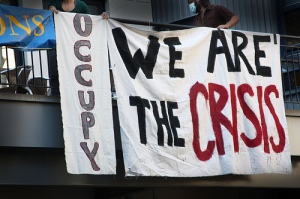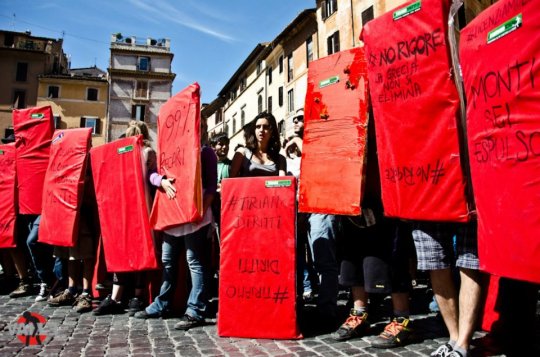Tagged: precarity
Excavating Minor Histories: Autonomous publishing for movements – An Interview with Stevphen Shukaitis
Summary: Stevphen speaks on militant research through collaborative, open process publishing, and on negotiating an ambivalent relationship to the university—appropriating resources while refusing to become the administrator of someone else’s precarity.
[This is Part 2, continued from Part 1 here.]
What can an open, insurgent publishing body do? – An Interview with Stevphen Shukaitis
Summary: Stevphen Shukaitis, editor of Minor Compositions, talks about the possibilities for open publishing as an experiment and a provocation. Drawing on his book, Imaginal Machines, he reflects on the challenge of resisting the recuperation of radical energies in work. As a professor in a business school, he shares his approach to radical teaching: using traditional materials for subversive ends.
Reanimating Histories of Struggle as Weapons against Neoliberal Individualization – An Interview with Don Kingsbury
Summary:
Reflecting on the building occupations at UC Santa Cruz in 2009-2010 and cross-pollination between student and worker struggles, Don Kingsbury highlights the need to excavate and reanimate histories of radical movements. Under the conditions of academic precarity, and against the neoliberal privatization of the general intellect, Don calls for turning communities of necessity into communities of resistance.
On ‘Service Learning,’ Precarity, and Building the Urban Commons with, against, and beyond Universities
Summary:
An adjunct discusses her experiences with using ‘service learning’ in classes to engage students in militant co-research and community organizing. Such projects can build radical relationships across universities, public schools, and marginalized communities, but require a lot of work – the challenge of building ‘the urban commons.’ Such work must also grapple with the dangers of recuperation in academia. Beyond the university, she discusses her engagement with urban commons in neighborhoods, such as through co-operatives. What kind of advantages and disadvantages does the flexibility of adjunct labor offer? From the position of precarious work and life, how can we organize for mutual aid across our workplaces and communities? Continue reading
If You Organize, You Always Win
In this interview, Joe Grim Feinberg shares his experiences with a radically democratic union, Graduate Students United at the University of Chicago. Rather than waiting for recognition from the state, they have thrived by getting together as workers, declaring themselves to be a union, and organizing to improve their working conditions. Joe praises the IWW’s strategy of organizing a union for all workers that, if followed consistently, de facto leads to an anti-capitalist approach. Such a strategy faces many limits, as grad students are habituated into academic professionalism, which goes against the idea of industrial unionism. Instead of professionalizing for individual insertion into the capitalist rat race, academics can take pride in what they do through organizing and taking control of the production process. Continue reading
Contaminating the University, Creating Autonomous Knowledge: Occupied Social and Cultural Centers in Italy
An Interview with Claudia Bernardi
Summary:
From her experiences creating an occupied social center in Rome, Claudia Bernardi speaks of self-organization and self-education between migrants, students, artists, and other precarious workers. Within the global crisis, these spaces of resistance make common institutions that cross the boundaries of the university and city. As a kind of autonomous study center, the project has intertwined labor union organizing with political movements and knowledge production. Building occupations have spread to include artists and other cultural workers who have squatted cinemas and theaters, making culture as a common good. In a time of proliferating borders and frontiers, we all become migrants, struggling across divisions for shared spaces, culture, and knowledge.
Standing at the interface of academic corporatization and exploitation: why not struggle against the ‘grain’?
by Sutapa Chattopadhyay[1]
[i]t’s increasingly difficult to define what, substantively, it means to be a thinker of the Left
(Castree and Wright 2005: 6)
Not too long back I read two articles on anti-austerity protest and Quebec student strikes that were published by ClassWarU, and a few others, mostly by activist student scholars. Almost all the articles and interviews that have been published so far in this website pertinently point out the urgent need to employ alternative pathways to connect people, participation and place. There is little to no doubt that the question of happiness and wellbeing is overwhelmingly difficult to answer, as it is ensnared by the laws of neoliberal capitalist accumulation, under continuous and progressive expropriation to the creation of hierarchies and hegemonies (through continuous division of labor along sex, race, class, religion, education, and nationality) to constant production of all forms of social exclusion. The poor and middle classes have shouldered the heaviest burdens of the global political obsession with austerity policies over the past five to six years. In the United States, budget cuts have forced states to reduce education, public transportation, affordable housing, health and other social services. In Europe, welfare cuts have driven some severely disabled individuals to fear for their lives. Austerity is still the order of the day and the struggle against austerity is an all-class war orchestrated in plazas, universities, parks, streets, squares, or any public places that we can think of. This article holds my deep reactions on academic exploitation at the crossing point of other kinds of exploitation that have burgeoned as a response to neoliberal capitalism. Continue reading
Teaching and Organizing in the Ruins of Universities: An Interview with Alison Hearn
 Summary: From the wilderness of adjuncting to university occupations and the Quebec student uprisings, professor Alison Hearn (U. of Western Ontario) discusses how we can create organizing grounds in the ruins of universities. The classroom presents possibilities for connecting pedagogy with organizing, while grappling with the tensions of context, faculty authority, and student resistance. Rather than falling into either authoritarian or hippy-dippy, de-professionalized modes of teaching, Hearn talks about how an ethically responsible approach can escape the academic capitalist rat race and build relationships across divisions of workers and students.
Summary: From the wilderness of adjuncting to university occupations and the Quebec student uprisings, professor Alison Hearn (U. of Western Ontario) discusses how we can create organizing grounds in the ruins of universities. The classroom presents possibilities for connecting pedagogy with organizing, while grappling with the tensions of context, faculty authority, and student resistance. Rather than falling into either authoritarian or hippy-dippy, de-professionalized modes of teaching, Hearn talks about how an ethically responsible approach can escape the academic capitalist rat race and build relationships across divisions of workers and students.
Continue reading
“Passing through”: Stories from thirty years of adjunct teaching in art history and social justice
Sharon Irish | April 2012
—
I will be 60 years old in November of 2012. I identify as white, female, heterosexual and middle-class, and I try to be cognizant of these social locations. I grew up in a mobile, middle-class family, the youngest of three daughters. My father was a sociology professor; my mother, who was the family anchor in many ways, worked very hard for not much pay at the jobs she was able to get each time we moved for my father’s job–in child care or in clerical work.
In 1985, after seven years of coursework and somewhat ambivalently-conducted research, I earned my Ph.D. in art history from Northwestern University. My ambivalence stemmed from my difficulty balancing a passion for art history with an awareness of the urgency and necessity for social justice. I have to admit it took me about twenty years of part-time, adjunct teaching to come to terms with my love of art history and how teaching in that area might support social justice work. A national conference of the Women’s Caucus for Art that I attended in 1990 was my first “aha” experience in understanding that feminism and visual culture offered myriad and powerful ways to intervene in US socio-political structures.
I offer two stories out of my teaching experience, since I think some specific examples might be the most useful to others.






